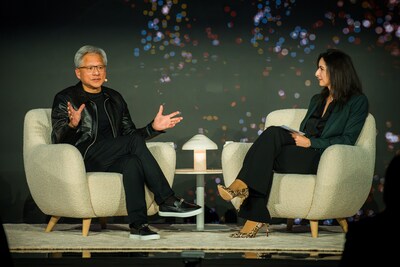"Gefion provides our Danish enterprises with entirely new opportunities," says Morten Bødskov, the Minister for Industry, Business, and Financial Affairs. "Gefion will drive the advancement of the green transition, enable tailor-made solutions, and strengthen the competitive standing of our companies in the global market. In a time of heightened international competition, this supercomputer acts as a vital enabler for advancing Danish businesses into the future. This ground-breaking technology represents an important opportunity for Danish companies and researchers to develop innovative solutions to future challenges."
Access to leading AI hardware and software from NVIDIA
Gefion is the result of a public-private partnership between the Novo Nordisk Foundation and the Export and Investment Fund of Denmark (EIFO), which funded a new company, the Danish Centre for AI Innovation A/S (DCAI) that now owns and will operate Gefion.
"It's a remarkable achievement that it has taken only six months from announcement to completion of this complex state-of-the-art supercomputer," says Nadia Carlsten, CEO of DCAI. "I am extremely proud of the team that came together and collaborated to turn this vision into a reality, delivering a leading capability that is now ready for customers to start testing new use cases. Gefion is the game-changer that many innovators had been waiting for."
Jensen Huang, founder and CEO of NVIDIA, says: "Denmark recognises that to innovate in AI, the most impactful technology of our time, it must foster a domestic AI infrastructure and ecosystem. The Gefion supercomputer will supercharge the scientists of Denmark with local AI computing infrastructure to drive advancements in life sciences, climate research and quantum computing."
Gefion is an NVIDIA DGX SuperPOD AI supercomputer, powered by 1,528 NVIDIA H100 Tensor Core GPUs and interconnected using NVIDIA Quantum-2 InfiniBand networking. Denmark up to now had no GPU-accelerated supercomputers, and a thorough consulting process with relevant stakeholders across the country had identified access to computing power as a key roadblock to progress in Denmark's otherwise thriving AI-based research ecosystem. Thanks to their massively parallel processing capabilities, GPUs have seen explosive growth over the past decade, following the emergence of deep learning and generative AI models that run much faster and more efficiently on these processors than on general-purpose CPUs.
Global data centre provider Digital Realty hosts the supercomputer in one of its AI-ready data centre facilities in Denmark. The data centre is designed and built to be sustainable and runs on 100% renewable energy. Eviden, the European leader in high-performance computing (HPC), has assembled and installed the computer using its vast experience and expertise in HPC integration and installation.
A groundbreaking private-public partnership
The Novo Nordisk Foundation has committed approximately DKK 600 million towards the initial costs of the centre, while EIFO has contributed DKK 100 million and owns a minority stake of 15% in the company.
"Establishing Gefion is a milestone, and it fits very well with the Novo Nordisk Foundation's vision of improving people's health and the sustainability of society and the planet, as it creates new opportunities and can accelerate finding new solutions to pressing challenges," says Mads Krogsgaard Thomsen, CEO of the Novo Nordisk Foundation. "In the future, we must cooperate even more with exceptional partners from all over the world if we are to solve the enormous challenges facing not only our own countries but the planet."
The Export and Investment Fund of Denmark has invested heavily in deep tech, and the partnership with the Novo Nordisk Foundation on DCAI represents a strategic focus on AI, quantum computing, the green transition, life sciences, and the commercialisation of research.
"Denmark is already an important player in AI-based research and business development, but we believe that Gefion will accelerate this many times over," says Peder Lundquist, CEO of EIFO. "Our investment in DCAI will support Danish businesses in for example green transition and life science, while also accelerating the commercialisation of research. Our aspiration is to create a value generating the deep tech ecosystem ahead of the curve."
The first use cases will show what Gefion can do
The supercomputer and collaboration with NVIDIA will help enable Denmark to pursue large-scale projects in countless fields where AI is a valuable tool, as well as within AI research itself. In selected flagship project areas, researchers will be able to engage with expert teams from NVIDIA to co-develop solutions to complex problems.
These include research in pharmaceuticals and biotechnology using the NVIDIA BioNeMo platform, including protein design; the acceleration of the green transition; and the development of fault-tolerant (i.e. error-free) quantum computing using NVIDIA CUDA-Q, an open-source hybrid quantum computing platform.
There has already been considerable interest in Gefion from researchers in Denmark's private and public sectors looking to access NVIDIA's AI technology to take on large-scale and data-intensive projects. A competition to identify innovative AI use cases that can fully harness the potential of Gefion saw over 50 proposals submitted in the span of just three weeks. DCAI announced 6 winning proposals that will run as part of Gefion's pilot phase.
The selected projects come from researchers, including from the University of Copenhagen and Technical University of Denmark (DTU); Go Autonomous, a startup in the transportation field; Teton, a healthcare startup; and the Danish Meteorological Institute. All of them will use Gefion to process very large data sets to find new solutions to problems that are extremely hard to solve without access to GPU-accelerated computing.
The First Pilot Projects
- "Large-scale distributed simulation of quantum algorithms for quantifying molecular recognition processes."
Contact: University of Copenhagen -
- "Unravelling CO2 reduction in Non-Metal Formate Dehydrogenase (FDH) using Machine-Learned Force Fields."
Contact: Technical University of Denmark
- "Multimodal genomic foundation model"
Contact: University of Copenhagen
- "Multi-Modal Document Understanding: Transforming Data Entry with Multi-Modal Precision."
Contact: Go Autonomous
- "Building an AI Care Companion with Large Video Pretraining."
Contact: Teton and the University of Copenhagen
- "SAPIEN - Skilful Atmospheric Prediction with Intelligent Environmental Networks."
Contact: Danish Meteorological Institute









